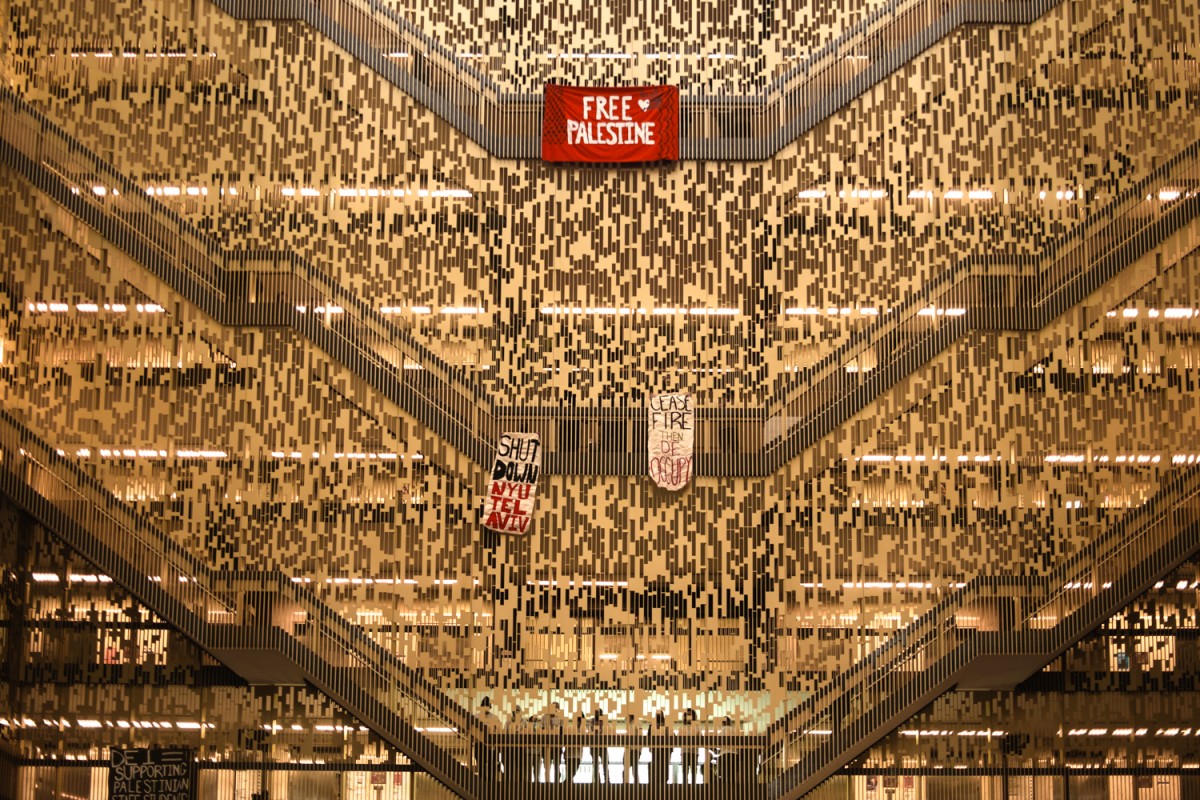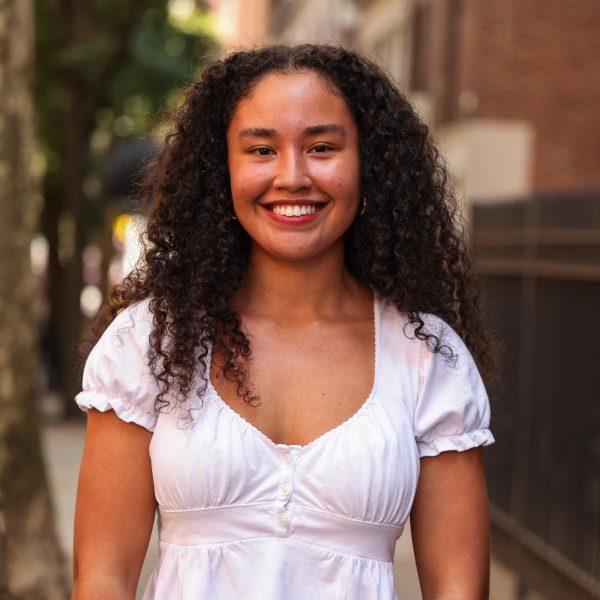Students and faculty discussed the history of the Israeli-Palestinian conflict and expressed solidarity for Palestinian resistance and academic freedom at a teach-in at the Iris & B. Gerald Cantor Film Center on Nov. 10, which was hosted by NYU’s recently-formed Faculty for Justice in Palestine group.
Representatives from on-campus student groups and faculty from various departments called for NYU to divest from pro-Israeli companies and for the university to shut down its study abroad program in Tel Aviv. Attendees received flyers upon entry that read “NYU’s Business with Genocide” and claimed the university has a stake in several Israeli companies and weapons manufacturers.
Faculty panelists discussed the history of the Gaza Strip, Native American studies, limitations on higher education in Gaza and the occupied West Bank, the killings of journalists and the United States’ role in the conflict. The Israel-Hamas war began on Oct. 7, when Hamas — the Palestinian militant group governing the Gaza Strip — launched a violent assault on nearby Israeli towns, which was followed by an ongoing ground invasion of Gaza by the Israeli military.
Gallatin and MCC professor and FJP member Paula Chakravartty said that the teach-in received no support from any of NYU’s departments and that the faculty group had to organize the event in a discreet manner to avoid being shut down.
“We have the right to use our expertise to speak to the current climate, to combat misinformation, to support our students and do our duties as teachers, as scholars and as public intellectuals,” Chakravartty said at the event. “Many of us teach courses in subjects such as history, political science, law, critical theory, media studies and more, where it is incumbent that we address the complexities of Israeli and Palestinian history and the current genocide.”
Among the students present at the event was Ryna Workman — the NYU Law student who was removed from their position as president of the school’s Student Bar Association for sending a message in the group’s weekly newsletter in support of Palestinian resistance. Workman criticized NYU Law for its silence in addressing the conflict.
“[NYU School of Law] is still silent as we witness ethnic cleansing and an ongoing genocide,” Workman said at the event. “It is indicative of a much broader problem of academic hypocrisy and apathy from institutions of higher education.”
The event comes after the recent suspension of pro-Palestinian student groups at Columbia University and Brandeis University. NYU’s chapter of FJP, which formed last month, has held on-campus demonstrations at Washington Square Park and inside Bobst Library, calling on the university to address Palestinian casualties in the war and support its Palestinian community.
Pro-Palestinian student groups have also called for NYU to do more for its Palestinian community at on-campus protests and accused the administration of neglecting it. Pro-Israeli demonstrations, including a sit-in at Bobst where a pro-Israeli student and her guest were assaulted last week, have also taken place on campus, following hundreds of reports of antisemitism from the Bronfman Center for Jewish Student Life.
Other student panelists attributed the ongoing conflict in Palestine to settler colonialism. Student panelist Tareq Radi, a Ph.D. candidate, said he thinks NYU acts as a “colony” due to the presence of its Tel Aviv program, and condemned the university for failing to address the growing number of Palestinian deaths in the war.
Some students and faculty have claimed that NYU’s Tel Aviv program violates NYU’s Code of Ethical Conduct and Non-Discrimination and Anti-Harassment Policy because of an Israeli law barring non-Israeli students who have called for a boycott of the country from entering. In a written statement to WSN, university spokesperson John Beckman said closing down NYU Tel Aviv would be “another form of academic boycott” and that doing so would violate academic freedom.
“NYU flatly rejects the call for closing NYU Tel Aviv and remains firmly committed to the program, which is very highly regarded by those who have studied and taught there,” Beckman wrote.
Sinan Antoon, a Gallatin associate professor, said he was proud to be a part of the teach-in and was moved by the passion of his colleagues as well as the student representatives who spoke in solidarity with Palestinians.
“We cannot stand by and be silent when a genocide is taking place,” Antoon said in an interview with WSN. “We join millions around the world who are calling for an immediate ceasefire. We will continue to speak up and call for justice and equality, and express our solidarity with Palestinians who are struggling against settler colonialism.”
CAS professor Sonya Posmentier — a member of FJP who was at the event — said events like the teach-in are central to the academic mission of NYU. She said she hopes the university’s administration will recognize the importance of encouraging academic inquiry so that these conversations can continue to take place.
“I hope that in the future, NYU will not only provide space for this kind of necessary international conversation among students, but will go beyond that to offer refuge, support and academic resources to scholars abroad whose work is made difficult or impossible by the ongoing siege and occupation, and the current onslaught of violence and destruction,” Posmentier told WSN.
Yezen Saadah contributed reporting.
Contact Mariapaula Gonzalez at [email protected].
























































































































































